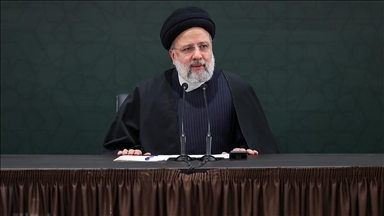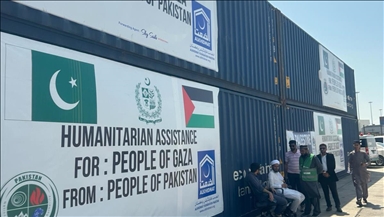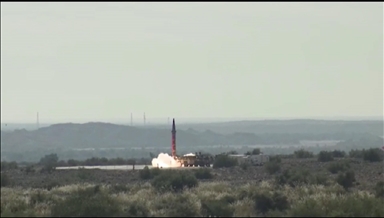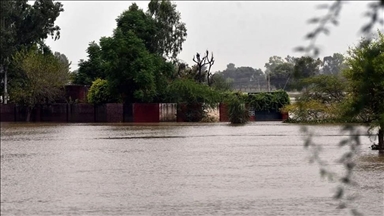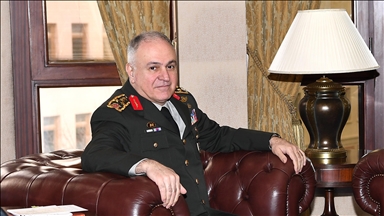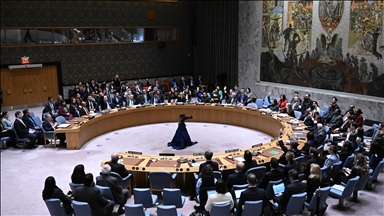Pakistan’s roadside iftar feeds thousands in Ramadan
People benefit from roadside fast-breaking meals arranged by volunteers during Muslim holy month of Ramadan
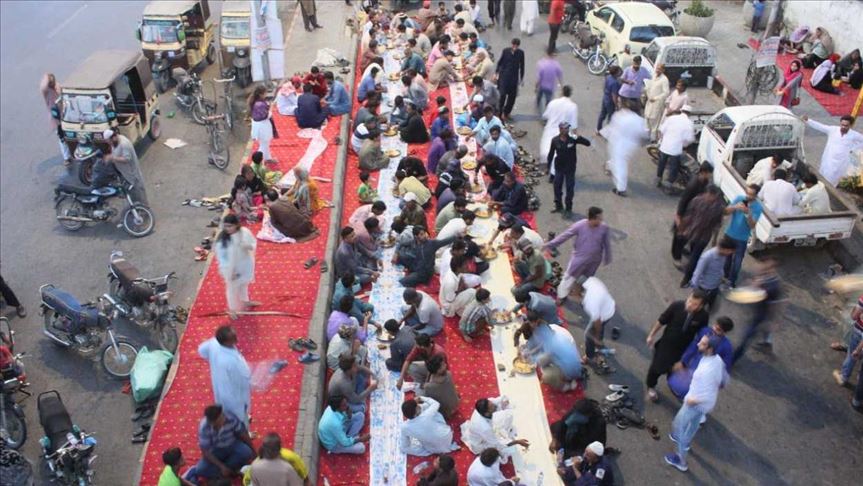 Fastbreaking (Iftar) gathering in Pakistan_ Photo by Sabir Mazhar
Fastbreaking (Iftar) gathering in Pakistan_ Photo by Sabir Mazhar
KARACHI, Pakistan
As the sun begins to fade in the Muslim holy month of Ramadan, volunteers start fixing traditional delicacies and drinks on scores of tables at different points of Karachi’s main University Road. Others roll large plastic mats on the stony footpaths and fill them with food.
Motorists pull over hurriedly and join small crowds of people of all ages already gathered around the tables or occupying the plastic mats. As the call for maghrib (sunset) prayer resounds from a nearby Mosque, they break their fast.
Another group of volunteers hand packets of food and bottles of water and juice to the fasting people sitting in their vehicles and public transport, who do not opt to stop.
Some 50 meters away, a different group of volunteers makes preparations for dinner to be served soon after iftar (fast-breaking). This all creates a brief traffic jam at this portion of the road.
Every Ramadan, hundreds of stalls are set up at the corners of city roads by relief organizations, and local residents where homeless people, vendors, rickshaw and taxi drivers, laborers, beggars and even those who do not fast are served free food and drinks for the whole month.
At several points, dinner is also served.
A few individuals had started to arrange roadside iftar during Ramadan for needy people in Karachi -- home to over 15 million people and the country’s commercial capital -- two decades ago, which now has become a tradition.
In no time, this tradition was adopted by scores of other cities including the capital Islamabad, where roadside iftar stalls feed tens of thousands of people during Ramadan.
So much so, the country's tiny Sikh community has been hosting iftar for Muslims in historic Qissa Khawani Bazaar and several other points in northwestern Peshawar city for the last several years.
“This is my sixth year to break the fast here”, Abdul Hameed, an Afghan refugee, told Anadolu Agency at a roadside stall on the University Road in Karachi.
Hameed together with his other colleagues work as a scavenger in the city’s eastern district far from his residence, and cannot afford to buy iftar.
"Mostly, we cannot reach home on time due to traffic jams and scanty transport. This (roadside stall) has resolved the iftar issue", he added.
The fasting people are served traditional delicacies -- including samosa (a deep-fried triangular savory pastry filled with potato and spices), pakora (deep-fried spicy snacks made from gram flour), fruit chaat, dates, and juices.
For dinner, Biryani (a spicy mixture of rice and meat) is the favorite dish of the people of Karachi.
"At least in Ramadan, we fully fill our stomach", Hameed said in a lighter vein as his colleagues laughed loudly.
Abdullah, a rickshaw driver is another regular visitor of this site during Ramadan.
“It's hard for me to go home [for iftar] and come back to work. Here, I get good and enough food, and save money that I spend on my family," he told Anadolu Agency.
Act of kindness
Zar Mohammad, one of the organizers, said he together with his friends and philanthropists, has been arranging free iftar meals for the last 20 years in a row.
"From first to last (evening) of Ramadan, we break our fast with these people here. sometimes our families also join us," Zar Mohammad, who is also a prayer leader at a Mosque, told Anadolu Agency.
About finances, Mohammad said the friends and families themselves, area shopkeepers, philanthropists and even common citizens, all chip in to arrange the event during the holy month.
"We do not have to run here and there for finances. A month before (Ramadan), we simply start to chip in and by the end of the month, we have plenty of funds to manage this all," he said, adding: "It has become a set tradition now. People trust us, and hand over huge amounts even without disclosing their names."
Around 1,000 people, including travelers, are served every day during Ramadan at this point, according to Mohammad.
Bhopal Singh, who arranges iftar in Qissa Khawani Bazaar in Peshawar said he was pursuing the mission of his late father who worked for interfaith harmony in Muslim-majority Pakistan.
"For the last four years, I had been arranging iftar for my Muslim brothers here. But this year, we have changed the strategy due to security threats," Singh told Anadolu Agency, referring to threats received by the organizers last year from some militant groups that objected to their gesture.
"Unfortunately, some elements do not want interfaith harmony here," he regretted, saying "Therefore, this year we are distributing ration among needy Muslims, and arranging iftar for prisoners in jail to avoid any mishap".
Monis Shaikh, a student of commerce faculty at Zulfikar Ali Bhutto University in Karachi, was excited as it was his first day as a volunteer.
"This is our first day to serve here," Shaikh said, with a nervous smile on his face pointing at a group of 8-10 students who were given instructions by an organizer.
The group plans to volunteer throughout the remaining days of Ramadan.
"Allah has blessed us with everything. It's our duty to serve and help his creation. This is the real message of Ramadan," he said.



